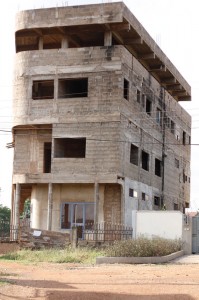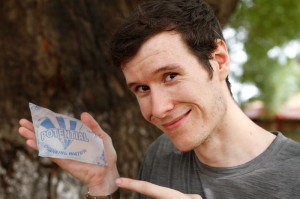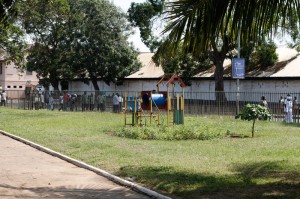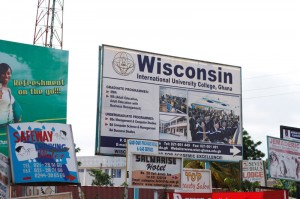Central Accra, we found it.
Today felt very eventful. After so many hours of travel we were pretty ragged yesterday, plus a few random miscommunications (lack of wireless ‘net here, etc) disempowered us. After settling in last night, we woke up nice and early today and got down to business.
First order of business: bucket shower. We had running water last night — although it was cold, it was at least running. Today: no water. Luckily we had filled a bucket last night, so we were able to bathe using that. It wasn’t so bad. The cold shower I had last night was actually the most refreshing cold-shower I’ve ever had. The last time I had to shower in cold water whilst shooting a film was in 2005, and today was a considerably better experience. I guess Ghana is superior to Lakeland, Florida when it comes to cold water showers. Readers take note.
After shower and deet application (and sunscreen for Miranda), we headed out. I now have a much better sense of our location, having left and returned by car today. We are basically 5 or 10 KM north west of the airport, in what is known as the Haatso (pronounced: hot-cho) region, between the Atomic and Legion (pronounced: lee-gawn) regions. Unfortunately this means we are reliant on cab or bus to get to Accra proper.
Here “buses” are really “tro-tro,” I have only seen one actual proper Greyhound style bus the entire time. I see many tro-tro, however, which are like Haiti’s tap-taps, but less colorful. They are all basically minivans of Japanese or European origin, with some variety of written decoration on them, I think which serve as some combination of indication that this is a tro-tro, and a means for the owner to proclaim his allegiance to some ideology. So far we have seen many with religious messages on the back (“God is the way” and that sort of thing), a smaller number with Twi (the local dialect) messages, and then some with quite random messages. Tro-tros are like bigger taxis that act as carpools, so perhaps it’s logical that taxis are decorated with the same sort of messages. From the third category of messages, I saw a Hyundai taxi today with “Lazy man gets no food” in large print on the rear bumper today.
The taxis and tro-tro are all in some mode of partial or utter neglect. We rode in a moderately decent one to Accra today, and then in a fully dilapidated one on the way back (metal on metal grind from front brakes, blown shocks, etc). My truck would be like a Lexus here, hah. None of this is surprising to me, I just thought some might find it interesting. In general Africa really hasn’t surprised me at all, yet. Maybe it’s that I am too well read, have seen too many documentaries, and am too hard to shock, but it is basically like a “real” version of much of what I have already seen … especially when you’re seen docs like Living In Emergency, normal Ghanaian life doesn’t seem so shocking, even though poverty is a real issue for many here.
Everywhere we go, whilst driving, it seems that one out of every ten buildings is half-finished, and with no intention/ability on the part of the builder to get moving anytime soon on the second half. I am not sure if this is a watermark of economic downturn, or simply “the way it is.” With the global economic climate I know that I encounter this sort of thing in Seattle (for instance: across the street from the Seattle Red Cross is a townhome complex that is in bank foreclosure), but it’s usually houses or townhomes, not concrete structures, and certainly not to the degree I see here. Here’s a shot of one of the more finished but obviously abandoned buildings…

Once we got into the city, we stopped at the art center (pronounce this “ott centuh” or you will confuse everyone). We managed to change our money at a small shop we were guided to by our new “friends.” These friends had appeared instantly as we egressed our taxi ($8CEDI to get from our homestay to central Accra), and wanted to sell us all manner of goods. We changed money at virtually the same rate I looked up on XE.com last night ($1.40CEDI to $1USD versus the official $1.42). Unfortunately we then got roped into a 30 minute (or more?) drum lesson and sales pitch in the container shop of one of our new friends. It was an interesting experience, though, and I look at it as though to learn to haggle, and to tell people to leave you alone, etc, you must first fail a bit at all of these tasks. Without failure can be no success, so it is okay we spent 30 minutes to have a drum lesson and then bought a $3 bracelet. The friend of the friend who made the drums and bracelets, well, he made paintings, which were halfway decent and quite colorful, and one we found would have made a very nice gift for one of our Kickstarter pledgers, but he wouldn’t come below around $18-20USD in price, and that was simply out of our budget. Perhaps we will revisit him before we leave and see if he has changed his mind. We spoke with them at length about Tamale (a large-ish city in the more arid north of Ghana), where they were all from.
One thing I’d read is that random people will shout “Orbuni” at you, which means “white person,” but I think better translates to “auslander” or “foreigner,” since Obruni refers to any American / European, regardless of his or her skin color. So far this has yet to happen — I am thinking it is more something that happens in rural areas. That said, we walked for hours today in downtown Accra, including the Sunday market (which was about half as busy as Pike Place Market would be on a Sunday, if that gives you any indication of the sheer number of people), and I saw a total of about 4 other white people. I would say about half of the people we pass on the street openly stare at us, the way someone might stare at a celebrity or perhaps someone riding a unicycle. A very small percentage of these people, maybe 20 or 30 people total over the day, will say “hello!” or “how are you” or maybe just speak to you in Twi.
Of this last behavior, I find it funny that we become so accustomed to something that even when we know it is illogical we will still do it. I will speak to animals and babies in full sentences, yet I know they cannot understand what I am saying. And I’ve noted people doing the same with us in Twi. We have made an effort to learn some Twi, however, and this has yet to fail to absolutely DELIGHT people.
If you purchase from a vendor, and say “muhDAHsee” (thank you) or someone randomly asks how you are and you reply, “ahFEY” you will be greeted with a huge smile. It is hard at this point to say what most people perceive of whites, but I suspect we are met with a countenance of general curiosity, and belief that we are wealthy and perhaps in some way “above” others who are not Obruni. In general Americans tend to project this idea of monoculturalism, so it is with great joy that I am working on learning little phrases, so that we can, even in just a small way, break little cultural conceptions and make someone smile with an unexpected thank you in Twi.
So although we haven’t been outright shouted at (at least not with “Obruni”) we are still stared at as Madonna or Bono would be in the US. On the walk back to find a cab we had a group of girls of maybe 13 or 14 years of age passing us and one reached out to touch our arms. It was clear she probably hadn’t touched many white folks and was curious to do so. I sort of enjoy this feeling, being able to provide people entertainment just by being me. The downside is that the other half of this perception is that you are a wealthy tourist, and so some people who talk to you are doing so only to sell you something or otherwise try to profit from you.
We stopped into a small outdoor cafe in an area with a “NO HAWKING” sign, and had a Fanta. Suddenly I realized how great it felt to not only sit down (something that is surprisingly difficult to do in Accra … there are no benches, let alone green spaces, more in that in a bit), but to sit down outside the reach of those who would surely soon approach us to (unsuccessfully try to) sell us something or show us their shop or whatever. This is where we saw our first two other Obruni, although they didn’t seem friendly, and then one more who also seemed unfriendly showed up.
I drank a liter of water in the first few hours of the day, and we bought 4 packages (supposedly 2L) of water just before the cafe. These packs of water are 5 pesawa, which is like 5/100 of a CEDI. Supposedly. We have met many people with math issues so far, as well as the change from old money (in the thousands) to new money (1000:1 with the old money) hasn’t quite caught on with everyone yet. Worse yet there seems to be some level of assumption taking place about money. Our room has no running water, but it does have a small TV with rabbit ears. On the television last night we saw a news headline proclaiming that Ghana Ministry of Something or Other requires 10 CEDI to implement national ID program. We went from wondering if the charge was $10CEDI per person, to realizing that it was 10 million (as the program progressed) and that here it seems they just assume you know the denomination. After all, if it was actually 10 Cedi, or even 10,000 Cedi, would it be on the news? I guess not.
We sat and drank our fanta and I opened the containers of water to put them in my steel [Klean Kanteen 40oz] bottle. I am unsure what is safe to drink here and what is not, and in the interest of not having Montezuma come to Ghana for a little of his revenge I have just been hitting any and all tap water with the Steripen (a UV light that kills microbes) before consumption (thanks Steve!). So perhaps the name of the water was fitting…

Another thing I have observed that I thought might just be for us Obruni, but I now am sure isn’t, is beeping of horns. We get beeped at nearly constantly, and we’ve discerned this means basically “I am a taxi/trotro and have no fare, do you need a ride?” It happens more to us I guess simply because Obrunis look like likely customers — we are probably tourists.
As it happens we bought a map today, after haggling the vendor down from $20CEDI to $5CEDI ($3USD). Miranda is getting good at haggling! After this, we were trying to find the ocean; something surprisingly hard to do. I led us down a street that should hit the ocean but it simply became more and more full of impoverished shacks and people looking more and more surprised to see us. I think the ocean was on the other side of the shacks but we literally couldn’t find an inch of space between them to verify this. Eventually we aborted, following a side street to a major road and walking back toward the market. We then stopped to steri-pen some water and as I debated if we should walk to the market or if we could find a taxi on this road, I hear a “beep beep,” and raised my hand instinctively. Instant taxi-ride. New Yorkers would love it here. They would already be used to some of the smells we’ve encountered too, hah, but that is another story.
On our taxi ride home our drive took us to Haatso proper and didn’t trust me that we were staying half a KM up the road. He had to find a Ghanaian to look at the address and give us directions (half a KM that way, just as I said!) before he would budge. This was surprising to me, to be treated as a child or someone who is otherwise ignorant of his surroundings, when I was clearly saying “yes, we walked here last night. Our homestay is half a kilometer further.” I am not sure if this is an isolated incident. I have read much about the perception that Obruni are weak (we steri-pen our water, need sunscreen, etc), but nothing of our stupidity or lack of directional awareness, so we’ll see.
We saw on the walk from the shacks to our final taxi ride (maybe a mile) “DO NOT URINATE HERE” written on walls in chalk at least three or four times. We also saw a woman openly urinate into a cup in the midst of the market (right out front of Accra’s fire station). That perhaps surprised me, I guess … maybe just that it was a woman doing it. Then again, I saw not one public restroom today, not one bench, not one park. Well, we did see ONE park. The only park in all of urban Accra, according to our map. It’s pretty pitiful…
But there is no hawking there, at least. With a giant sling there is a set of trees I could slackline here. Hmm.
Also, last but not least, for you Badgers out there, it seems Wisconsin has a [bootleg?] University here:
-Adam










